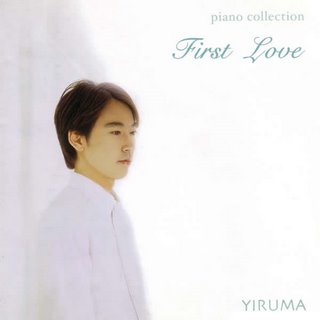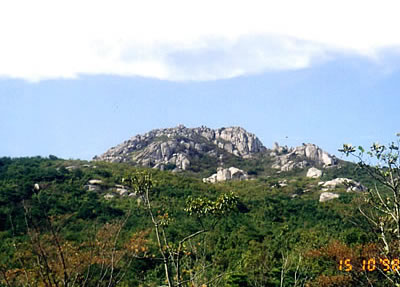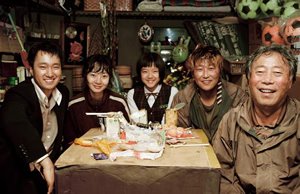It was raining heavily in Seoul. It was May 2002 and I had just arrived in Itaewon. The spring season normally brought on a lot of rainfall. I expected it but there was nothing much I could do except to "glue" myself to the TV inside my hotel room.
I was watching a talkshow in ArirangTV channel and the guest for that show was Yiruma. The name Yiruma (이루마) sounds very much Japanese but no, he is a Korean. I had no idea who Yiruma was but was interested enough to know what he was good at. From the show, I kinda of knew that he was a new age pianist and he was Korea's answer to Richard Clayderman and Yukie Nishimura.
After the rain stopped, I took the subway to COEX Mall and bought my first Korean CD - "First Love" by Yiruma.

I was watching a talkshow in ArirangTV channel and the guest for that show was Yiruma. The name Yiruma (이루마) sounds very much Japanese but no, he is a Korean. I had no idea who Yiruma was but was interested enough to know what he was good at. From the show, I kinda of knew that he was a new age pianist and he was Korea's answer to Richard Clayderman and Yukie Nishimura.
After the rain stopped, I took the subway to COEX Mall and bought my first Korean CD - "First Love" by Yiruma.









 한국에서 가장 인기 있는 괴물이 곧 싱가포르에서 나다날 거예요. 이주 후에 9월7일부터 극장에서 볼 수 있어요. 이 영화가 재미있을 것 같아서 보기를 너무 기대해요. 언제나 괴물이 있는 영화를 좋아해요. 나는 괴물도 좋아하겠어요.
한국에서 가장 인기 있는 괴물이 곧 싱가포르에서 나다날 거예요. 이주 후에 9월7일부터 극장에서 볼 수 있어요. 이 영화가 재미있을 것 같아서 보기를 너무 기대해요. 언제나 괴물이 있는 영화를 좋아해요. 나는 괴물도 좋아하겠어요. 비디어
비디어
 岛上的树木,整齐地排列在步道两旁。草地旷阔,空气清爽,很适合散步,骑自行车和野餐。不过,观光客一多,散步起来,一点情调都没有。骑自行车,或许是比较不错的选择。在春天的气候中,骑自行车在树荫道上来回暗爽的样子,其实很不错。可惜我当时没有那么做。所以现在只可以凭想象来暗爽一下。
岛上的树木,整齐地排列在步道两旁。草地旷阔,空气清爽,很适合散步,骑自行车和野餐。不过,观光客一多,散步起来,一点情调都没有。骑自行车,或许是比较不错的选择。在春天的气候中,骑自行车在树荫道上来回暗爽的样子,其实很不错。可惜我当时没有那么做。所以现在只可以凭想象来暗爽一下。 물론 돈이 가장 중요하죠! Of course, money is very important in life but in our Korean class it has achieved "the most important" status. I don't think we are really crazy about money when we keep using money as the subject or object in our sentences. In fact, we always laugh at our own shallow replies.
물론 돈이 가장 중요하죠! Of course, money is very important in life but in our Korean class it has achieved "the most important" status. I don't think we are really crazy about money when we keep using money as the subject or object in our sentences. In fact, we always laugh at our own shallow replies.

 If you can imagine this. You have been reading my blog for two years. Even though we have not met, to you, it may seem that you have "known" me for two years. You will know the cafe which I like to visit on a free afternoon. The time and station where I took the last train home. The people whom I like and the things which I dislike. But to me, I will not know of your existence. The time that I "know" you has yet to start. There is a different between the time you "know" me and the time I "know" you. This "time-lapse" between us is two years.
If you can imagine this. You have been reading my blog for two years. Even though we have not met, to you, it may seem that you have "known" me for two years. You will know the cafe which I like to visit on a free afternoon. The time and station where I took the last train home. The people whom I like and the things which I dislike. But to me, I will not know of your existence. The time that I "know" you has yet to start. There is a different between the time you "know" me and the time I "know" you. This "time-lapse" between us is two years. 올해 3월20일부터 26일까지 싱가포르 국립 대학 한국어 프로그램의 학생들이 함께 한국 경희 대학교에 한국어 연습하러 갔어요. 그번이 아마 싱가포르 학생 처음 경희 대학에서 한국어를 공부했어요. 그 때에는 참 우리한테 즐거운 1주일이었어요. 수업이 재미있었어요. 친절한 선생님들이 한국어를 많이 가르쳐셨어요. 도우미들도 많이 도와 주고 우리들과 같이 여기저기 구경했어요. 또 MBC 방송국, 남미섬, 경복궁, 국립 중앙 박물관하고 청계천에 가봤어요. 1주일밖에 경희 대학에서 할 수 없어서 많이 아쉬웠어요. 정말 좋은 시간을 보냈어요. 경희대를 그리워요!
올해 3월20일부터 26일까지 싱가포르 국립 대학 한국어 프로그램의 학생들이 함께 한국 경희 대학교에 한국어 연습하러 갔어요. 그번이 아마 싱가포르 학생 처음 경희 대학에서 한국어를 공부했어요. 그 때에는 참 우리한테 즐거운 1주일이었어요. 수업이 재미있었어요. 친절한 선생님들이 한국어를 많이 가르쳐셨어요. 도우미들도 많이 도와 주고 우리들과 같이 여기저기 구경했어요. 또 MBC 방송국, 남미섬, 경복궁, 국립 중앙 박물관하고 청계천에 가봤어요. 1주일밖에 경희 대학에서 할 수 없어서 많이 아쉬웠어요. 정말 좋은 시간을 보냈어요. 경희대를 그리워요! This is my country flag. As with anything official, there will always be meaning tagged to each of its features. The red and white horizontal sections represent universal brotherhood and purity respectively. The crescent moon represents a young and rising nation. The five stars represent our nation's ideal of democracy, peace, progress, justice and equality.
This is my country flag. As with anything official, there will always be meaning tagged to each of its features. The red and white horizontal sections represent universal brotherhood and purity respectively. The crescent moon represents a young and rising nation. The five stars represent our nation's ideal of democracy, peace, progress, justice and equality.